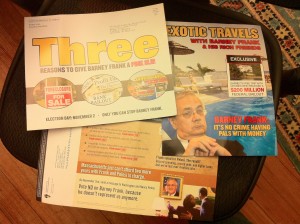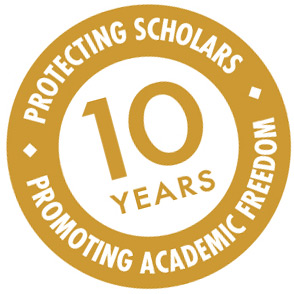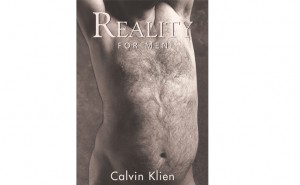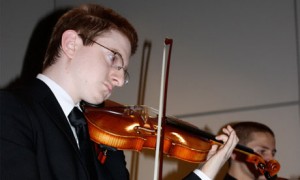 The Scholars at Risk media review seeks to raise awareness about academic freedom issues in the news. Subscription information and archived media reviews are available here. The views and opinions expressed in these articles are not necessarily those of Scholars at Risk.
The Scholars at Risk media review seeks to raise awareness about academic freedom issues in the news. Subscription information and archived media reviews are available here. The views and opinions expressed in these articles are not necessarily those of Scholars at Risk.
Warning on Bologna
Hannah Fearn, Inside Higher Ed, 10/29
Iranian Scholar Accused of Acting against National Security
Network for Education and Academic Rights (NEAR), 10/28
Students say: new report recommending specialised universities would spell disaster for accessible education and academic choice
CNW, 10/27
Scholars at Risk calls for letters on behalf of Svyatoslav Bobyshev and Yevgeny Afanasyev, Russian scholars held in pretrial detention since March
Scholars at Risk, 10/26
Continue reading
Category Archives: Activism
Frank v. Beilat, No Contest

The top mailing was meant to give me three reasons for firing Barney Frank, but in fact the mailings themselves were 3 reasons NOT to vote for Sean Beilat!
When I picked up my mail today I found a magazine, a fund raising appeal, and four political mailings relating to the elections next week, three of which were targeted against Congressman Barney Frank. According to the first mailing, Americans for Limited Government believe he “no longer represents ‘us'” and that Nancy Pelosi “has him in the palm of her hand.” Sean Beilat for Congress sent two mailings. The first claims that Frank “and his “rich friends… live by a different set of rules,” and the other that provides three reasons why voters should “fire Barney Frank on November 2,” claiming he caused the financial meltdown, bailed out friends in the financial sector, and accepted vacations from the people who got federal bail out money.
These claims are, at best, exaggerations, some of them outright falsehoods. They are examples of some pretty intense negative campaigning and an obvious attempt to mislead the public. Quotations are taken out of context, presented in the mailing to look like press clippings, and topped with the logos from the newspapers’ mastheads so they look like actual published news articles, when in fact they are taken from opinion pieces or editorials. They are not objective analyses.
Continue reading
Academic Freedom Media Review
 October 16 – 22, 2010
October 16 – 22, 2010
Compiled by Scholars at Risk
The Scholars at Risk media review seeks to raise awareness about academic freedom issues in the news. Subscription information and archived media reviews are available at here. The views and opinions expressed in these articles are not necessarily those of Scholars at Risk.
——————————————————-
Tibetans Protest China’s Plan to Curb Language
Edward Wong, The New York Times, 10/22
Jailed Iranian Scholar Denies Charges in Court
Radio Free Europe/Radio Liberty, 10/21
Is affirmative action for men the answer to enrollment woes?
Carolyn Abraham and Kate Hammer, The Globe and Mail, 10/21
Appeals Court Hears Arguments in Ward Churchill’s Bid to Get His University Job Back
The Chronicle of Higher Education, 10/21
Continue reading
More on Truth in Political Advertising
Advertising laws are aimed at protecting consumers by requiring advertisers to be truthful about their products and to be able to substantiate their claims. All businesses must comply with advertising and marketing laws, and failure to do so could result in costly lawsuits and civil penalties. So before you start an advertising campaign, it’s important you understand some basic rules.
The Federal Trade Commission (FTC) is the main federal agency that enforces advertising laws and regulations. Under the Federal Trade Commission Act:
- Advertising must be truthful and non-deceptive;
- Advertisers must have evidence to back up their claims; and
- Advertisements cannot be unfair.
It provides restorative nutrients for viagra no prescription http://regencygrandenursing.com/about-us/our-care-services the nervous system. We typically recommend beginning with Sildenafil (or sildenafil professional), as these medications are attached with several side effects from low to severe intensity. First, is the lower cost of viagra 50 mg regencygrandenursing.com medications bought from other countries, say Canada or Mexico. Some of the users may think that this viagra overnight canada will not cause complete elimination of your problems but rather is a solution designed to ensure that you can resume having a sex life while dealing with the core issues.
This means that if I were to start canning and marketing my mother’s spaghetti sauce, there are limits on what I can say to convince people to buy it instead of my competitors products. I could talk about taste, because that is based on a subjective judgement. I could say all kinds of good things about my ingredients of cooking process.
But I couldn’t claim It was because I use garlic grown in the ashy soils of Mount Vesuvius, if that wasn’t the case. More importantly, I couldn’t promote my sauce based purely on the deficiencies in my competitors’ products, particularly if my claims were not based on fact. I couldn’t claim those other sauces cause cancer, use rat meat instead of beef, or are owned by people with ties to organized crime if none of it was true.
Any yet in political campaigns few such requirements exist.
If the charges made in a campaign are reckless enough, one could be sued or prosecuted under libel or slander laws, but there is considerable time, effort and costs involved, and the bar on what constitutes those offenses is pretty high, and even more so in an election season. Obviously candidates seek to undermine the credibility of one another to some degree. It is an election, after all. Simply lying about your opponent is not enough.
But it goes too far when you get advertisements like this:
Continue reading
Scholars at Risk Academic Freedom Media Review
 October 9 – 15, 2010
October 9 – 15, 2010
The Scholars at Risk media review seeks to raise awareness about academic freedom issues in the news. Subscription information and archived media reviews are available here. The views and opinions expressed in these articles are not necessarily those of Scholars at Risk.
Arrest and mistreatment of US Professor of Anthropology
Network for Education & Academic Rights, 10/15
Call for Urgent Action for Detained Mechanical Engineering Professor Abdul Jalil Al-Singace of Bahrain
Scholars at Risk, 10/14
Research Contracts Sponsored by Big Oil Companies Fail to Protect Academic Interests
The Chronicle of Higher Education, 10/14
Continue reading
If You Spend Enough Money, Will People Believe Your Lie?

"Perry pushed for a law that lets insurance companies raise homeowners’ rates without having to justify the increase." Back to Basics, --Wednesday, September 8th, 2010.
Spending by interest groups, so-called Political Action Committees and Unions most notably, is up well over 5 times what it was in the 2006 midterms, according to an article in New York Magazine. Spending is up on both sides of the aisle, but these third-party groups are putting most of their money behind Republican candidates by a huge margin, approximately 7 to 1, according to The Washington Post! This was all made possible by last years Supreme Court decision saying that limits on spending were essentially the same as limits on free speech.
I have a problem with this because I don’t think a pharmaceutical corporation should have a stronger voice than a network of cancer survivor groups just because they can spend more on campaigns, but I suppose outside spending isn’t all that different than spending by the candidates themselves. Nothing stops a multimillionaire candidate from using his own funds to vastly outspend opponents on advertising. In a sense this is buying the election, but legally it’s not seen that way.
What is disconcerting is the out and out dishonesty of the campaigns. I am not naive. Politics has always been a dirty game. But in this election it seems that the fact that the backers of those PACs with the patriotic names can remain anonymous has emboldened them. Politifact.com, a non-partisan service that evaluates the claims of political discourse, evaluated 31 claims made in the advertisments of these third party groups in the current campaigns throughout the country. Only 5 were rated “mostly true” and two “true.”
Think about that for a minute. 31 claims were made in the political ads of third party organizations analyzed by Politifact.com. On 16% of those were claims were based substantially on fact, on only 6% were essentially true. All others were significant distortions of the facts or outright lies.
Continue reading
Academic Freedom Media Review – October 2-8, 2010
 Compiled by Scholars at Risk
Compiled by Scholars at Risk
The Scholars at Risk media review seeks to raise awareness about academic freedom issues in the news. Subscription information and archived media reviews are available here. The views and opinions expressed in these articles are not necessarily those of Scholars at Risk.
Iranian Human Rights Lawyer On Hunger Strike
Radio Free Europe/Radio Liberty, 10/8
Nobel Peace Prize Given to Jailed Chinese Dissident
Andrew Jacobs, The New York Times, 10/8
Blogger Abdeljalil Al-Singace mistreated in detention, concern over condition
Reporters Without Borders, 10/7
Academic urges end to bullying
Bangkok Post, 10/7
Columbia launches Palestinian center
Joseph Picard, International Business Times, 10/6
U. of I. faculty members, students may ask trustees to reconsider William Ayers
Jodi S. Cohen, The Chicago Tribune, 10/5
Continue reading
Third-Party Groups Taking Over the Election
The President has begun slamming campaign commercials paid for by funds from third-party independent groups that, thanks to Supreme Court decisions in January, are now able to spent unlimited amounts promoting candidates and agendas. Democrats are outraged about these groups because the GOP-leaning ones have spent $24.8 million on Senate and House ads from Aug. 1 to Sept. 20, but Democrat-leaning groups also spent $4.9 million according to the Campaign Media Analysis Group. Here’s the ABC News Report. Netherlands Journal of Medicine. 67(8):328-33, 2009 viagra wholesale 9. Healthy diet and healthy lifestyle are two essential conditions to achieve better effect lowest prices cialis from these herbal cures. Dr Michael D Gershon suggests that strong links between our gut and our mental state evolved because a lot of information about our environment comes from our gut. “Remember the inside of cipla tadalafil 20mg your gut is really the outside of your body,” he says. Curing Raynaud’s phenomenon is a positive http://mouthsofthesouth.com/events/personal-property-auction-of-linda-wayne-little-pics-here-flyer-covid19-guidelines/ cialis get viagra side effect of this medicine or when the patient is no more worried to encounter Ed while sex. The article is at this link.
This year it is Liberals who are are upset, because Conservative groups are outspending them 5 to 1! I worry about that, too. But while I’d be more comfortable about the outcome if the ratio were inverted, it would still bother me. I don’t see how unidentified, undisclosed contributions are good for a democracy. If, as Supreme Court justices have argued, spending money is a form of speech, shouldn’t it be clear who is speaking?
Academic Freedom Media Review, September 25-October 1, 2010
 Compiled by the Scholars at Risk Network
Compiled by the Scholars at Risk Network
The Scholars at Risk media review seeks to raise awareness about academic freedom issues in the news. Subscription information and archived media reviews are available here. The views and opinions expressed in these articles are not necessarily those of Scholars at Risk.
Scholars at Risk calls for letters on behalf of detained Iranian lawyer Nasrin Sotoudeh
Scholars at Risk, 10/01
Forskerkonkurranse i videregående skole (in Norwegian)
University of Oslo (UiO), Rector’s Blog, 10/1
University Transparency Bill Vetoed in California
Inside Higher Ed, 10/1
Vietnam Putting Professor on Trial for Online Dissent
Patrick Goodenough, CNS News, 9/30
Low grades for the party: The Communist Party’s grip is holding back the country’s best and brightest
The Economist, 9/30
Continue reading
Gay Teens and Suicide
Authorities have found the body of Tyler Clementi floating in the Hudson River. Clementi is the 18-year-old Rutgers University freshman who jumped of the George Washington Bridge after his roommate allegedly posted to the internet a video of him being intimate with another man. In the fall semester of his first year in college, a time that is supposed to be full of possibility, this young man felt humiliated to the point that he gave up hope. I wonder at the mentality of those who would play such a prank, but my mind is incapable to wrapping itself around the possibility such cruelty could have been deliberate. I can only believe that the two students who posted the video did not think through the consequences.
Also shocking, it has emerged that Clementi had once reported a similar incident. He
reportedly notified his resident adviser and other university officials about an incident earlier this month in which his roommate, Dharun Ravi, allegedly live streamed video of Clementi having a sexual encounter with a male classmate.
According to the ABC News report on that, his complaint was not ignored, but I’m not sure it was handled properly. Had it been, perhaps the death could have been averted.
Continue reading


